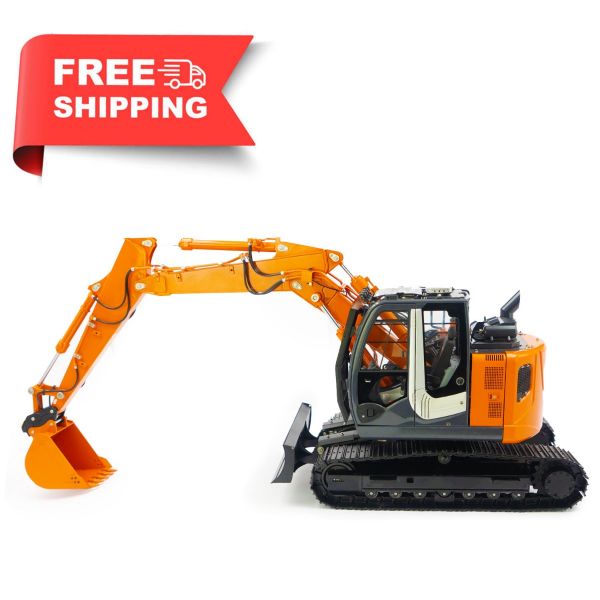Recognizing How Excavator Functions and Its Effect On Efficiency
Excavators play an essential role in construction and mining operations, depending on an intricate interplay of mechanical and hydraulic systems. Their capability to execute a selection of tasks hinges on both their style and the innovation incorporated within. Understanding these elements can substantially influence functional efficiency and productivity. As improvements proceed to reshape the sector, one have to take into consideration how these adjustments will certainly affect future methods and performance.
The Fundamentals of Excavator Mechanics

The Duty of Hydraulic Equipments in Excavators
At the heart of excavator operation exists the hydraulic system, which plays a critical duty in powering the device's functions and movements. This system utilizes pressurized hydraulic fluid to move power, making it possible for various activities such as moving, digging, and training. By harnessing the concepts of hydraulics, excavators can do jobs with remarkable precision and pressure, enhancing total operational efficiency.The hydraulic system contains essential components, consisting of cyndrical tubes, valves, and pumps, which function together to manage the circulation and instructions of the fluid. When the operator involves the controls, the hydraulic fluid is routed to certain cylinders, translating the driver's commands right into physical movement. This mechanism permits smooth and responsive actions, which are necessary in building and excavation environments. double e volvo rc excavator. The performance of the hydraulic system directly affects the efficiency and versatility of the excavator, making it a vital element in contemporary excavation procedures
Key Elements of an Excavator
Comprehending the vital parts of an excavator is important for realizing exactly how this powerful machine operates. An excavator contains a number of substantial components, including the undercarriage, house, boom, arm, and container. The undercarriage offers stability and mobility, typically featuring tracks or wheels to browse various terrains. The home consists of the engine and hydraulic systems, permitting the operator to regulate movement and power the maker. The boom prolongs from your home, allowing upright reach, while the arm connects to the bucket, promoting digging and training operations.Additionally, the taxicab houses the operator, furnished with controls for precise maneuvering. Each of these parts plays a vital function in the excavator's general performance, adding to its performance and performance on building sites. Recognizing these components aids in maintaining and enhancing excavator performance, making certain jobs are finished safely and successfully.
Attachment Adaptability and Its Benefits
Attachment adaptability is a vital aspect of excavators, allowing drivers to switch between different tools tailored for details jobs. This versatility not just enhances work effectiveness yet also adds to cost-effectiveness by reducing the need for several devices. Understanding the different sorts of attachments available can considerably impact the general efficiency and functionality of an excavator on work sites.
Types of Attachments
While excavators are mostly acknowledged for their digging capabilities, their true flexibility hinges on the broad range of accessories available. These attachments improve the excavator's functionality, permitting it to carry out different jobs past excavation. Common add-ons consist of containers (for digging and scooping), hydraulic thumbs (for grasping materials), and augers (for piercing holes) Grapples are made use of for dealing with and moving debris, while rippers can separate hard surface areas. Other specialized attachments, such as plates and plows, enable excavators to adjust to particular work requirements. This variety not just increases the device's energy throughout various markets, including landscaping, construction, and demolition, however additionally enables operators to customize their devices to meet certain task demands efficiently.
Boosted Job Effectiveness
Maximizing task efficiency is a primary benefit of making use of different excavator attachments. Various accessories enable an excavator to carry out numerous tasks without requiring to change equipment, conserving beneficial time and labor. Making use of a hydraulic hammer can damage concrete while a container accessory can dig deep into soil, enabling a smooth workflow. This convenience minimizes downtime connected with devices changes and boosts performance on-site. Furthermore, specialized attachments improve precision in tasks such as grading or landscaping, resulting in better end results. The capacity to adjust to various task requirements not only improves procedures but likewise lessens the demand for added machinery, making sure that projects are completed promptly and properly. Generally, attachment flexibility substantially adds to boosted job performance in excavation work.
Cost-Effectiveness and Flexibility
Cost-effectiveness is a significant advantage of making use of versatile excavator add-ons. These accessories allow a solitary excavator to do multiple jobs, lowering the requirement for extra machinery and labor - double e volvo rc excavator. By changing in between pails, hammers, and grapples, drivers can tackle numerous jobs, from digging to demolition, therefore taking full advantage of devices application. This flexibility not just reduces functional prices but additionally lessens downtime connected with transforming tools. In addition, the capacity to customize excavators with specialized accessories improves efficiency, as they can efficiently handle varied jobs according to job needs. To conclude, the combination of cost-effectiveness and versatility in excavator accessories contributes to improved functional efficiency and source appropriation in building and construction and excavation jobs

Advanced Innovation in Modern Excavators
Modern excavators are increasingly furnished with advanced technology that changes excavation processes. go to my blog Automation improves operations, while boosted gas effectiveness minimizes operational costs. In addition, smart control systems enhance precision and safety and security, noting a significant development in excavation devices.
Automation in Excavation Processes
As excavation modern technology advances, automation has arised as a vital component in boosting performance and accuracy on task sites. Modern excavators are outfitted with sophisticated automated systems that facilitate jobs such as grading, digging, and trenching with very little operator treatment. These systems utilize sensing units, GPS, and maker knowing algorithms to assure precise placing and depth control, greatly lowering the margin for error. In addition, automation enables operators to concentrate on critical decision-making as opposed to hand-operated controls, resulting in boosted efficiency on the whole. Such developments not just improve operations but likewise boost safety by lessening human error in complicated procedures. The combination of automation in excavation procedures stands for a significant advancement in construction innovation, driving the sector in the direction of better efficiency and efficiency.
Improved Fuel Performance
Advancements in innovation have likewise caused substantial renovations in gas performance for contemporary excavators. Modern machines are furnished with innovative engines that maximize power result while lowering fuel consumption. These engines utilize cutting-edge burning modern technologies, such as turbocharging and straight fuel injection, to enhance performance and efficiency. Additionally, light-weight products in building and construction lower total weight, allowing for less energy expenditure during procedure. The intro of variable speed controls enables drivers to readjust engine efficiency according to specific tasks, further decreasing fuel usage. Therefore, these enhancements not only reduced operational costs yet also add to ecological sustainability by minimizing discharges. On the whole, improved fuel efficiency in excavators is a crucial development that bolsters performance and financial practicality in the building market.
Smart Control Systems
While drivers navigate significantly complicated work websites, smart control systems in excavators have actually arised as vital tools for boosting efficiency and accuracy. These innovative innovations use algorithms and sensors to check different specifications such as load weight, surface conditions, and functional efficiency. By automatically adjusting hydraulic functions, smart systems optimize equipment efficiency, resulting in boosted productivity and lowered wear on parts. In addition, operators benefit from intuitive user interfaces that give real-time comments and diagnostics, permitting for educated decision-making. This integration of innovation not just streamlines procedures however also reduces human mistake, contributing to more secure job atmospheres. As the building and construction market continues to advance, smart control systems will play an essential duty in shaping the future of excavator effectiveness and performance.
Enhancing Functional Effectiveness With Excavators
Excavators play an essential role in improving functional performance throughout numerous construction and excavation jobs. Their convenience enables several jobs, consisting of lifting, material, and digging handling, which streamlines process and lowers the need for extra equipment. With powerful hydraulic systems, excavators can execute durable tasks with accuracy, significantly reducing the moment called for to complete tasks. The integration of advanced modern technology, such as GPS and automated controls, further enhances their procedure, making it possible for drivers to attain better precision and decrease product waste. Furthermore, modern excavators are made to take in less gas and minimize emissions, contributing to both cost savings and ecological sustainability. By making use of excavators properly, building and construction teams can enhance productivity, fulfill task due dates, and enhance general website administration. This multifunctionality and efficiency make excavators crucial tools in the modern construction landscape.
The Future of Excavators in Building And Construction and Mining Industries
As the building and mining markets progress, the future of excavators is positioned for considerable change Our site driven by technical advancement and altering functional demands. Advances in automation and artificial intelligence are improving excavator abilities, permitting improved precision and performance in operations. Independent excavators are emerging, lowering the need for human intervention and decreasing the threat of accidents.Moreover, the integration of telematics and IoT technology allows real-time monitoring of maker efficiency and predictive maintenance, optimizing uptime. Eco-friendly styles, consisting of hybrid and electrical models, are gaining grip, straightening with sustainability objectives within the industry.Additionally, using innovative materials and lighter styles improves gas efficiency while maintaining performance requirements. As these fads progress, excavators will certainly play a vital function in satisfying the raising needs for productivity and security in building and mining, inevitably changing operational landscapes.
Often Asked Inquiries
Exactly How Do Weather Affect Excavator Efficiency?

Climate problems considerably affect excavator efficiency, as rain and mud can hinder grip and stability, while extreme temperature levels may affect hydraulic systems. Operators must adapt to these variables to ensure excellent functionality and security throughout operations.
What Precaution Should Operators Follow While Making Use Of Excavators?
Precaution for excavator operators consist of putting on proper individual safety equipment, performing pre-operation assessments, guaranteeing proper communication with ground workers, preserving a safe range from above risks, and sticking to established functional procedures to avoid accidents.
Just How Typically Should Excavators Be Maintained for Ideal Performance?
Excavators must be maintained on a regular basis to ensure peak efficiency, generally every 250 operating hours or as defined by the producer. Regular checks enhance reliability, avoid unexpected malfunctions, and extend the lifespan of the tools.
What Is the Typical Lifespan of an Excavator?
The typical lifespan of an excavator typically varies from 10,000 to 15,000 hours of operation. Factors influencing durability consist of upkeep techniques, running problems, and the high quality of the machine her explanation itself, impacting general performance and performance.

Can Excavators Run on Irregular Terrain Successfully?
Excavators can run properly on unequal surface due to their verbalized designs and adjustable tracks. These attributes enable them to keep security and grip, allowing reliable operation in difficult settings commonly experienced in building and landscaping projects. Each of these elements plays a vital role in the excavator's overall capability, adding to its effectiveness and efficiency on building and construction sites. Maximizing job efficiency is a key benefit of using various excavator attachments. While drivers browse significantly complex job websites, smart control systems in excavators have emerged as necessary tools for enhancing effectiveness and precision. Excavators play an essential duty in boosting operational performance across various building and excavation tasks. Developments in automation and synthetic intelligence are improving excavator capabilities, enabling for enhanced precision and effectiveness in operations.